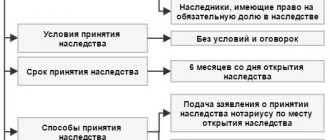Home » Inheritance » How to enter into an inheritance after the death of a husband
9
The rules and procedure for entering into inheritance are regulated by the third part of the Civil Code of the Russian Federation. In the specified order and distribution of shares of inherited rights, the official wife of the deceased has a special advantage, but her actions within the framework of accepting property are subject to requirements and restrictions determined by law and the testator’s will. It is recommended to pay special attention to some of them.
Who inherits after the death of her husband?
The wife, as the heir of the first priority, according to the law, can formalize the inheritance on an equal basis with other applicants of the corresponding order, which include: legitimate children (joint and, if any, born from a previous marriage) and parents.
In the event that the testator's children died at the same time as him or earlier, the circle of priority heirs includes grandchildren.
But this principle of entering into inheritance is valid only in the absence of a will of the deceased. Otherwise, property rights and obligations may be transferred to the person specified in the testator’s administrative act. This can be a relative of any order or a person not related to the deceased, as well as a legal organization.
In this regard, the testator is free to choose an heir according to his personal considerations and transfer any property in the desired amount, if this does not contradict the legislation of the Russian Federation, that is:
- inheritance does not act as collateral when applying for a loan;
- there are no persons in the testator’s circle who have an obligatory share of property rights;
- the material benefit was not acquired during marriage (makes sense if the spouse is ignored in the will);
- the main legal successor was not recognized by the court as unworthy;
- the will was not contested or declared void.
Acceptance of rights is carried out only after the death of the testator personally by the heir or his authorized representative in the presence of a previously certified paper.
How is an apartment inherited by law?
Initially, all heirs of the first stage are identified. This includes the spouse of the deceased, his children, including those from a previous marriage, as well as each of the parents of the deceased.
In this case, all close relatives have equal inheritance rights to the apartment after the husband.
For example, if the testator (deceased person) has no one else except his wife, then only she has rights to all property . If the circle of heirs includes a wife and two children, then the property is divided between them into three equal parts.
It should be remembered that the wife’s rights to an apartment after the death of her husband arise if at the time of his death the spouses were in a registered marriage. The former spouse, from whom a divorce has been officially filed, has no right to claim the inheritance.
When the property did not completely belong to the husband, but was acquired during the marriage, only half of the living space will be inherited. That is, the husband’s share in the common joint property of the spouses. In any case, the other part of the property will remain with the wife.
The rules we describe apply not only to residential premises, but also to any other real estate and land plots.
Features of inheritance by a wife after the death of her husband
Art. 256 of the Civil Code of the Russian Federation establishes the legal regime for the common property of spouses. In practice, this means that all property and real rights that were acquired by spouses during marriage belong to both of them on an equal basis. And in most cases, it does not matter whether only one spouse was the main “breadwinner” or whether the family budget was formed from the income of two. However, the controversy surrounding this could be resolved in different ways.
Example one. A married couple with a traditional view of the family (the husband works and provides for his wife, a housewife, and a common child) will have equal rights to property acquired with the husband’s income. This is explained by the fact that the spouse made her contribution by pursuing a generally beneficial goal - raising a child and running a household.
Example two. The same working husband and non-working wife, only with pronounced signs of the wife’s antisocial behavior - a complete lack of participation in family affairs and the common child. According to the testimony of witnesses, such a “keeper of the hearth” may be deprived of the right to half of the joint property in court.
- Read more: How the husband's inheritance is divided
This and the rest noted above are important to know not only during a divorce. For a widow, the allocation of a marital share is no less necessary, because, according to Art. 1112 of the Civil Code of the Russian Federation, the composition of the hereditary mass can only include the personal property of the deceased, and the common property of the spouses is essentially not such. At the same time, you do not have to choose between the share of the inheritance after the husband and half of the total assets. In accordance with Art. 1150 of the Civil Code of the Russian Federation, the rights to hereditary and jointly acquired property do not replace each other, but are the prerogative of the widow, as an heir by law or will.
When entering into an inheritance, the right to allocate half of the spouses' common property also belongs to the husband's relatives - parents, children from his first marriage, dependents (not necessarily consanguineous). This may be necessary in cases where the joint property was registered in the name of the surviving spouse. In such a situation, the widow is deprived of part of the property, which she can later acquire as part of her inheritance share.
Example. During the marriage, the joint funds of the spouses were used to purchase: a country house, a common business (cafe) and a car. This property was registered in the name of the spouse. After the death of her husband, his child from his first marriage submitted an application for the allocation of the marital share to the notary at the place where the inheritance was opened. Thus, half of the house with a plot, a car and a cafe are added to the inheritance estate, which consisted of the personal apartment of the deceased.
The inheritance is divided equally between two successors - the wife and an adult child, since the deceased did not leave a will. As a result, the widow could become the owner of 1/2 of the apartment, 3/4 of each jointly acquired property. But by agreement with her husband’s child, she gives up part of the apartment and car, taking for herself 1/4 of his country house and a common business with the deceased.
It is worth noting that all the rights and privileges described are only valid if you have a valid marriage certificate. A dissolved marriage or cohabitation excludes the legality of the property claims of the former or common-law wife. But this does not disinherit her joint children with the deceased. They are the primary heirs by law, and in the event of a minority or incapacity for work, they are also the legal holders of the compulsory share of the father’s property.
How to inherit an apartment in your name after the death of your husband
Don’t know how to register an apartment after the death of your husband? Call our lawyers!
The loss of a loved one (parents or spouse) is always a difficult loss. However, after the hassle associated with the funeral, the turn of inheritance comes.
And many women may be faced with the question of how to properly arrange an inheritance after the death of their husband? After all, there are many nuances depending on the type of property and its location.
Entry methods
According to Art. 1153 of the Civil Code of the Russian Federation, the spouse of the deceased can enter into inheritance in two ways:
- by submitting an application to a notary;
- actually.
Actually
The actual entry into an inheritance is recognized by law as equivalent to registration through a notary and also requires compliance with a six-month period. It is considered completed if the heir exploits the property, maintains, repairs, and pays off debts associated with it.
Actual is the most convenient way to accept an inheritance for the testator’s wife. But this mainly applies to the house or other property frequently used by the wife.
However, it would be safer to secure your rights by notary, because if the first-priority applicants do not accept the inheritance within six months, their rights will pass to the next heirs within three months. In this case, the notary may not be aware of the actual acceptance of the property and count the absence of a will from the wife as ignoring the inheritance. The resulting misunderstanding will not be easy to correct later.
Notarized
The advantage of this method is the guarantees that the heir acquires along with the property rights of the deceased. The guarantees concern reliability and, surprisingly, ease of registration of inheritance.
Reliability is expressed in the official confirmation of ownership of the received object. The act of its adoption, if necessary, can be confirmed by a certificate of the right to inheritance and/or a request for relevant data from the Unified Information System of the Notary, containing information about all significant actions within the framework of a specific inheritance case.
Notarization, despite its apparent complexity, in the future is much easier to carry out than actual succession. The reason for this is the lack of litigation. After all, the fact of inheritance will sooner or later require official registration and after six months from the date of death of the testator, it can only be done on the basis of a court decision, in which the actual successor will need to prove timely entry into possession of the inherited property.
Registration by will
If the deceased left behind notarized orders and indicated in them his, now widow, to enter into the inheritance she will have to follow the following instructions:
- Take a marriage certificate, a death certificate of a spouse, title documents for common property and submit them to a notary along with an application for the allocation of the marital share from the estate.
- Obtain a certificate of title to half of the property.
- Provide the notary with a will and an application for acceptance of the inheritance and issuance of a certificate of right to it (the latter is optional).
- Pay the state fee.
- Obtain a title deed for the inherited property.
Thus, and if there are appropriate orders from the testator, the “common-law” wife can also become a successor. However, she should exclude the first two points from the above plan, since she does not have the right to jointly acquired property.
In law
The algorithm for a wife’s actions in the absence of a will does not differ at all from that described above. The widow must also appear before the notary at the last place of residence of the deceased to submit an application for acceptance of the inheritance, indicating in it:
- the date of death of the testator and the address of his last registration;
- personal data of the heir;
- a brief description of the inherited property;
- date of application and signature of the applicant.
The only difference is that instead of a will, the successor must present a marriage certificate with the now deceased.
Based on this application and the list of necessary documents, the notary issues a certificate of inheritance rights, which is requested by the registration authorities when registering the property.
Re-registration of an apartment after the death of the owner
Therefore, the first step is to determine whether a will has been made and, if so, whether it is valid and not subsequently revoked.
However, it must be taken into account that such a refusal cannot be revoked, and having given the share of the apartment due to him, having signed the refusal at the notary, in the future the refused heir cannot demand anything from the heir in whose favor he refused the inheritance.
If there is no will, the ex-wife may receive part of the inheritance if the following conditions are met:
- There must be no heirs of all seven orders, and they may not accept the property or refuse it.
- The ex-wife must be incapacitated (retired, disabled) at the time of the death of the testator.
Note. Read all about the problems associated with assessing the value of real estate that is the subject of an inheritance that opened before January 1, 2005, and about what value the property is valued at - at the inventory value of the BTI or at the market value.
Inheritance documents
When registering property rights with a notary, the spouse of the deceased must be presented with a package of legislative acts, which include:
- death certificate of the testator;
- title documents for an apartment, land, vehicle or bank deposit;
- Marriage certificate;
- wife's ID card;
- act of appraised value of property;
- extract from the House Register;
- a document confirming the last place of residence of the deceased;
- receipt of payment of state duty (0.3% of the value of the inheritance);
- certificate of absence of debts on the property.
The notary may require the heir to provide additional documents and certificates, and in order to speed up the process, it is recommended to clarify the full list of required papers in advance.
Valuation of an apartment for inheritance
It is extremely important to have the property assessed at the time of the decedent’s death for several reasons:
- To determine the basic value of the premises, on the basis of which the amount of state duty is calculated, it is necessary to submit documents of all three types of assessment to the notary;
- To distribute property in parts between heirs, to determine the amount of compensation for each heir as necessary;
- If the heirs resolve disputes in court regarding property and the distribution of shares, then the court will necessarily request a property valuation report.
The notary will require a property valuation report drawn up by a licensed specialist, who will sign and stamp the completion of the property valuation procedure, indicating the determined value in a specific amount.
To conduct a residential property assessment, the following documents are required:
- Certificate of registration of real estate;
- Documents on the basis of which the testator can be identified as the owner of the premises;
- Certificate from the technical inventory service;
- Technical and engineering passport of the apartment, floor plan;
- Documents on the basis of which the value of the apartment is underestimated, which include loan agreements, collateral agreements, and other onerous papers.
The assessment is carried out long and carefully to take into account all the nuances and features of a particular residential premises.
To understand in detail the procedure for conducting assessment activities, it is necessary to compile a list of actions:
- First you need to find an appraiser who has a license to perform these services;
- The exact date and time of the inspection of the apartment is determined with the customer;
- After inspecting the premises, an agreement on the provision of valuation services is drawn up, and the documents necessary to carry out this procedure are transferred to the appraisers;
- After inspecting the premises and studying the documents, the appraiser draws up an inspection report;
- Within a week, appraisers prepare a report on the work and provide the customer with an assessment report for the residential premises.
It should be taken into account that there are situations when an assessment of the premises must be carried out forcibly, if specialists were not allowed into the apartment, in which case they carry out the assessment on the basis of documents.
After carrying out all the necessary actions to assess the premises, the customer must receive three documents:
- Certificate of conclusion on the work to evaluate the residential premises with the determination of the ordered cost of the apartment;
- An agreement on the provision of assessment services between a specialist and a customer must be accompanied by a sales receipt or a receipt for payment for the services of specialists;
- Evaluation protocol.
After receiving documents with a certain value of the apartment, the notary can determine the amount of state duty for each heir. If the value is determined in a foreign currency, then it is necessary to recalculate it into rubles at the exchange rate of the Central Bank of the Russian Federation at the time of the assessment.
Deadline for registration of inheritance
To carry out hereditary succession, the widow needs to hurry - the procedure established for this must be carried out within six months from the date of her husband’s death. This rule is reflected in Art. 1154 of the Civil Code of the Russian Federation and is typical for most cases of inheritance.
An exception for the spouse may be extreme circumstances that have become an objective obstacle to compliance with the temporary regulations. The objectivity of the situation presented is assessed by the judge of the district justice authority.
Restoring the deadline for accepting an inheritance relates to claims proceedings, since it is based on a property dispute between two parties - the “unpunctual” widow (plaintiff) and the heirs (defendants) who disagree with her position.
In order to protect her rights in court, the testator's wife will need to file a claim and provide reliable evidence that the obstacles to accepting the inheritance were insurmountable within 6 months from the date of the testator's death.
Litigation can only be avoided with the help of friendly successors. If they agree to voluntarily “share” or completely give away the inheritance they have already formalized in favor of the priority heir, then the matter is resolved exclusively through notarial actions.
In order for the consent to have legal force and serve as the basis for restoring the missed inheritance period, it must be made orally in the presence of a notary or sent to him in writing with a notarized signature.
Right to inherit an apartment
A death certificate is issued based on the death certificate provided. However, there are situations when the fact of death is established through the court (for example, in the case of a missing person). The basis for issuing the document in this case will be the corresponding court decision. Does this deprive her children of the right to inherit the living space after my death? Should I formalize this somehow? I’m married, but I don’t have children of my own.” In any case, the mother’s refusal to inherit does not deprive the children of any rights. There are two options: either you make a will for your sister's children, or they will participate in the legal inheritance process after your death.
This is important to know: Allocation of a share in a privatized apartment
After this period, the specialist issues inheritance certificates to all candidates, which are supporting documents for the inheritance. After receiving this paper, recognized recipients can contact the registration authorities for the subsequent re-registration of ownership of the land plot in their favor.
A court decision on the division of land may be to approve the right of purchase of all shares by one heir. During the consideration of the claim, the applicant or defendants can conduct an appraisal examination and determine the amount of compensation for their share of the inheritance.
State duty
The only costs required by law for registering inherited property are the payment of state fees. Its size is established by the Tax Code of the Russian Federation.
To perform notarial actions for issuing a certificate of inheritance, 0.3% will be withheld from the estimated value of the acquired property. This rate is relevant for the wife of the deceased and his other close relatives (parents, children, brothers and sisters).
But the costs of registering an inheritance, as a rule, are not limited to paying for notary services. This is followed by state registration of property, or rather, making changes to existing data about the property.
To register the transfer of hereditary property with the state registration authorities, the widow will have to pay:
- 2000 rubles - for home decoration *;
- 200 rubles - per apartment *;
- 350 rubles – registration of a land plot;
- 850 rubles - car;
- 800 rubles - making changes to the register of legal entities.
* - if the wife lived in the registered living space during the life of the deceased, she is exempt from paying the state fee for her re-registration.
A widow’s entry into inheritance may be difficult due to claims from other relatives, ignorance of her legal rights, or in other difficult cases. In each of these situations, it is important to adequately assess the circumstances and know the nuances of the legislative framework or contact a competent specialist who can provide effective and timely assistance in eliminating these problems.
Lawyers from the website ros-nasledstvo.ru are ready to provide urgent assistance in resolving inheritance issues. To get a free consultation, describe the problem in the appropriate field and wait for a response within 5 minutes.
FREE CONSULTATIONS are available for you! If you want to solve exactly your problem, then
:
- describe your situation to a lawyer in an online chat;
- write a question in the form below;
- call Moscow and Moscow region
- call St. Petersburg and region
Save or share the link on social networks
- FREE for a lawyer!
Write your question, our lawyer will prepare an answer for FREE and call you back in 5 minutes.
By submitting data you agree to the Consent to PD processing, PD Processing Policy and User Agreement
Useful information on the topic
4
How to restore the missed deadline for accepting an inheritance
The law limits the period allotted for accepting an inheritance to 6 months from...
97
How to enter into an inheritance after death without a will according to law
A will is an act of unilateral expression of the will of the testator, allowing one to determine the future fate...
24
How is the inheritance divided between the wife and children after the death of the husband?
After registering the marriage, the husband and wife acquire in relation to each other...
12
How to prove and confirm relationship with the deceased
The presence of family ties is the main condition for a calling to inheritance...
21
Inheritance of a privatized apartment after the death of the owner by law and will
After privatization, the apartment used on the basis of a social tenancy agreement passes...
92
How much does it cost to enter into an inheritance from a notary in 2021?
The amount of expenses for entering into an inheritance after death depends on...
Re-registration of a house after death
Here you can choose two options: sell your share to your spouse (if the divorce is tense and full of scandals), or donate part of the apartment.
Receiving a land share as an inheritance is often associated with some difficulties, which can only be resolved in court. Registration of inheritance is strictly regulated by the Civil Code of the Russian Federation, which establishes certain procedures for entry and deadlines for the implementation of such an opportunity.
Be prepared to pay from 500 to 3,500 rubles for this, depending on the document and the property in question.
A state fee is paid separately, the amount of which is determined by tax legislation. Thus, persons of the first and second priority will pay 0.3 percent of the value of the inheritance. However, no more than one hundred thousand rubles.
Some lawyers are of the opinion that theoretically the ex-wife can be classified as the eighth line of heirs, although in practice this is almost impossible to apply.
Not to mention how important the procedure is to re-register land, that is, the ownership of another person.
From the moment of divorce, she is not a close relative of her ex-husband and, accordingly, is not included in the circle of heirs.
Saher_Sinka16AT 10/14/2015, 3:26 pm # IMHOnotary will refuse registration since 6 months have passed, then the court will restore the deadline, the court will ask “why did they miss it?”, it will come out that the relatives actually accepted the inheritance, then the glass ball does not show well... If there was registered, he cannot refuse (answer below) And if he was not, he will receive a refusal from the notary, with which he will go to court.
What share does the spouse receive?
The first procedure before dividing the inheritance between relatives is the spousal allocation of the share. No one except the wife has the right to claim this half of the property. The second half is left for division by the heirs.
The spouse also has the right to divide the second part, that is, the inheritance mass. In addition to the marital share, the wife will receive another part of the inheritance.
The marital share is prescribed by law. The wife must provide the notary with all documents that confirm the purchase was made during the marriage. In controversial situations, they resort to litigation.
Entry dates
Please note: the period for entering into inheritance is exactly six months. The first day is considered to be the day after death. If the date is difficult to determine, it is set by the court.
Also, the starting day of the countdown may be the refusal of the direct heir to accept the due property or the birth of an heir after the death of the man.
If the application is submitted not in person at the notary, but by mail, then the date of filing the application is considered the day the letter was sent, and not the day it was received, much less executed.
Please note: if the heir of the first stage refused and the right passed to the heir of the second stage, then the documents must be completed three months in advance.
What rights to inheritance does a common-law wife have?
An official marriage in the Russian Federation is recognized only if it is registered with the civil registry office. In other words , after the death of the husband, registration of inheritance in the name of the common-law wife is impossible. There are two possible exceptions:
- if the testator left a valid will and indicated in it the name of his common-law spouse;
- if the wife was dependent on her common-law spouse for a year before his death (she lived with him and received financial support, which was her only income), and also has the right to an obligatory part of the inheritance.
In the latter case, she will be able to receive the due share of the inheritance even if there is a will in which her name is not present. The amount will be ½ part of the share of property that would be due to the wife by law. Read more on this topic here Inheritance rights of a common-law wife. Inheritance procedure.
Didn't find the answer to your question? Find out how to solve exactly your problem - call right now or fill out the form online: +7 (Moscow) +7 (St. Petersburg)
It's fast and free!
Payment of state duty
If the inheritance is received by first-priority heirs, in 2021 they must pay 0.3% of the value of the inheritance received, but not more than 100,000 rubles.
Other heirs pay 0.6% of the value of the property. For them, the upper threshold is 1 million rubles.
But inheritors of:
- living space if they lived together with the testator;
- property of those killed in the performance of public duty (also victims of political repression);
- bank deposits, pension payments, amounts of intellectual remuneration;
- insurance payments due to the death of the deceased as a result of an industrial accident;
- minors, incompetent heirs.
Disabled people of the first and second groups have a 50% discount.
The tax is paid regardless of whether the spouse inherits by will or by law. The amount of the state duty will be the same in both cases.
How to re-register an apartment after the death of its owner
Succession upon death of individuals in civil law is called inheritance. This is a special legal procedure for transferring ownership of the property of a deceased person to his legal successors or persons designated as such in the will document.
Methods of inheriting property
Meanwhile, the legislation regulates the order of inheritance in two ways, depending on whether the deceased owner drew up a testamentary document during his lifetime or whether he gave any orders before his death. If such orders took place and they were drawn up in the manner prescribed by law, then such succession is called a will.
When the deceased owner did not draw up any documents during his lifetime or his last order was not properly executed, the law determines who becomes the successor.
A will allows you to leave your property even to those who have absolutely no relation to the deceased person and are not his relatives. Also, a will may leave a certain order, condition, etc. to the successors.
Registration of inheritance: deadlines and list of documents
Like any other procedure in law, inheritance begins with the application of the successor.
However, the law limits the time period within which such an application must be filed.
So, if during the first six months from the date of the owner’s death the successor does not submit an application, then the law recognizes him as an abandoned successor, which entails deprivation of the right to inherit.
The official authorized to receive such an application and conduct the inheritance case is a notary.
He also formalizes the rights of successors, unless there are grounds for going to court regarding the succession of a particular property. In this case, the court decides who will be the successor.
In addition to the application itself, the inheritance cannot be formalized without the following documents:
- successor's passport;
- a certificate from the registry office certifying the fact that the person was declared dead;
- a special medical certificate stating the death of a person;
- a testamentary document or order of the deceased, executed in a legal manner;
- an extract from the housing organization on the list of persons who lived together with the deceased person;
- a document certifying the right of the deceased owner to his home;
- passport for a property from the cadastre.
However, the law does not limit the court or notary’s right to demand other documents that they consider necessary for an objective assessment of the state of affairs. It all depends on the specifics of the situation, the characteristics of the housing, the number of successors, etc.
An apartment appraisal is also needed. If a state assessment of housing has been carried out within the last 3 years, then an extract with the relevant information from the cadastre must be submitted to the notary or the court. Otherwise, you will have to hire a private specialist - an accredited appraiser - to establish the market price of the inherited apartment.
This is important to know: How to transfer ownership of an apartment to a relative
The management of the inheritance case continues for 6 months after the death of the apartment owner. This period is also referred to as the period for clearing the inheritance, when notaries, together with the successors, take measures to pay off the debts of the deceased person.
Upon receipt of such a certificate, the successor needs to contact Rosreestr and register his ownership rights. Only after this procedure will he be the full owner of the apartment.
More details about the procedure for processing documents:
In general, an inheritance case can be considered as several stages, presented as a set of actions. Let's take a closer look at each of them.
Stage 1. Removing the deceased from registration
The deceased citizen must be removed from registration with the migration service. The Migration Department of the Ministry of Internal Affairs issues a special certificate from the place of last residence of the deceased owner of the apartment, as well as a special extract confirming his deregistration. It is necessary that the specified extract reflect the reason for deregistration, namely, the death of the person.
Stage 2. Contacting a notary
Only after receiving a certificate from the migration department of the Ministry of Internal Affairs should you contact a notary. You need to submit an application to the notary who operates in the area indicated in the certificate from the migration department of the Ministry of Foreign Affairs as the last area of residence.
Stage 3. You collect all the necessary documents that we mentioned above
After filing an application, the deadlines established by law for the acceptance of property lose their legal meaning. In the future, the inheritance case can continue as long as the successors collect the necessary documents.
Stage 4. Obtaining a certificate
The notary is given approximately two weeks to check all submitted documents and determine the status of the property and successors. If the inheritance does not contradict the law, the notary will issue a certificate to the successor.
At this stage, the successor must pay a state fee, which is determined by a notary in accordance with tax legislation. Without paying the fee, the certificate will not be issued.
Step 5: Registering your ownership
After receiving the certificate, the ownership rights certified by it must be registered with the authorized body. The fact is that real estate objects are subject to state registration, without which the ownership of them is not recognized by government agencies.
Who can inherit after the death of the mother?
Read here about who will become the heir to the deceased’s apartment.
Registration is carried out in Rosreestr. Based on the results of registration, the successor is also issued a certificate, but not of the right of inheritance, but of the right of ownership.
Place of inheritance
Basically, the place of succession is the last place of residence or place of registration of the deceased person.
If the last place of residence of the testator is not known, or the location of the property being inherited is different, then you can contact a notary at the location of the property.
***
Thus, in order to obtain rights to inheritance, the spouse should adhere to the procedure established for this by the legislator and after the expiration of the established period, she will be issued a certificate of the right to inheritance.
Re-registration of an apartment after the death of the owner
Home » Inheritance » registration of inheritance » Re-registration of an apartment after the death of the owner
Most people acquire ownership of certain real estate during their lifetime, most often a home: an apartment or a private house.
Meanwhile, not every person thinks about death and what will happen to his property after his death. However, this is an inevitable process and sooner or later the owner’s successors will have to face this problem.
Recommendations for inheriting property after the death of a spouse
So, we have already found out that the wife is one of the primary heirs. Therefore, the wife’s share in her husband’s inheritance will directly depend on the presence of other claimants to the property.
In any case, it is worth contacting a notary in time, having first collected all the required documents. It is possible that at the same time you will have to deal with the valuation of the property. The state duty paid for obtaining a certificate of inheritance will depend on these data.
The services of a lawyer for inheritance cases in St. Petersburg can significantly facilitate the process of taking over your rights. It is only important to contact him in time.
Author: Oleg Vladimirovich Roslyakov, source.
What documents are needed
A wife, in order to obtain ownership of property previously owned by her husband by inheritance, should prepare:
- A document certifying the death of a spouse (certificate or death certificate);
- Personal passport;
- Certificate confirming marriage;
- Documents indicating the value of property owned by the spouse who died (for example, the cadastral value of an inherited apartment);
- Documents – the grounds for the deceased person to obtain rights in relation to the transferred property;
- Testamentary document (if any);
- A receipt or other payment document confirming payment of the mandatory state fee;
- An application for inheritance rights completed by the spouse.
Not everything is clear yet? Then read: what documents are needed to open an inheritance case with a notary, their list and receipt. ⇐
Statement
To be able to participate in the inheritance procedure, you need to contact a notary with a corresponding application. Below we will tell you how to arrange it, but it is better for the notary himself or his assistant to help you.
The application contains the following list of information:
- The name of the notary office to which the person applies;
- Personal information of the spouse who is the heir (full name, information about place of residence and contact information);
- Further, in the main part of the application, the circumstances that allow the applicant to obtain rights to the property are indicated. The application must indicate the date of death of the person, his data, as well as all information about the property that is subject to transfer by inheritance.
- At the end of the application, you should indicate your intention to receive the inheritance.
An application for acceptance of inheritance under a will can be found here. ⇐
The order of succession established by law
Inheritance is the transfer of ownership from a deceased person to other persons. Inheritance occurs by law and by will.
The latter option has priority over inheritance by law, except in cases where the inheritance is not always provided in the shares specified by the deceased.
You can start registering an inheritance within 6 months from the date of death of the testator.
In the case of receiving an inheritance by law, the heirs receive the property in order of priority.
The very first in line are:
- spouse;
- parents/adoptive parents;
- children;
- grandchildren by right of representation.
The order of inheritance by right of representation is inheritance of the share of an heir who died before the opening of the inheritance . This method of inheritance refers to the right of inheritance by law.
If there are no heirs of the first stage, heirs of the second stage can inherit. The same principle works for the following queues.
The priority is indicated in Articles 1142 - 1145 of the Civil Code of the Russian Federation (Chapter 63).
But if representatives of a certain line who are called to inherit are found unworthy, they will be deprived of this right. The fact must be confirmed by a court decision.
The following persons may be recognized as unworthy heirs:
- who committed illegal, deliberate actions against the testator;
- those who have committed illegal, deliberate actions against persons inheriting property;
- parents who claim inheritance after the death of their child, but have long and maliciously evaded parental responsibilities.
In addition to the inheritance lines, there are persons who receive a guaranteed share of the property in the inheritance - the disabled dependents of the deceased.
The main condition is to be supported for the entire last year, and it is not necessary to live with the testator.







